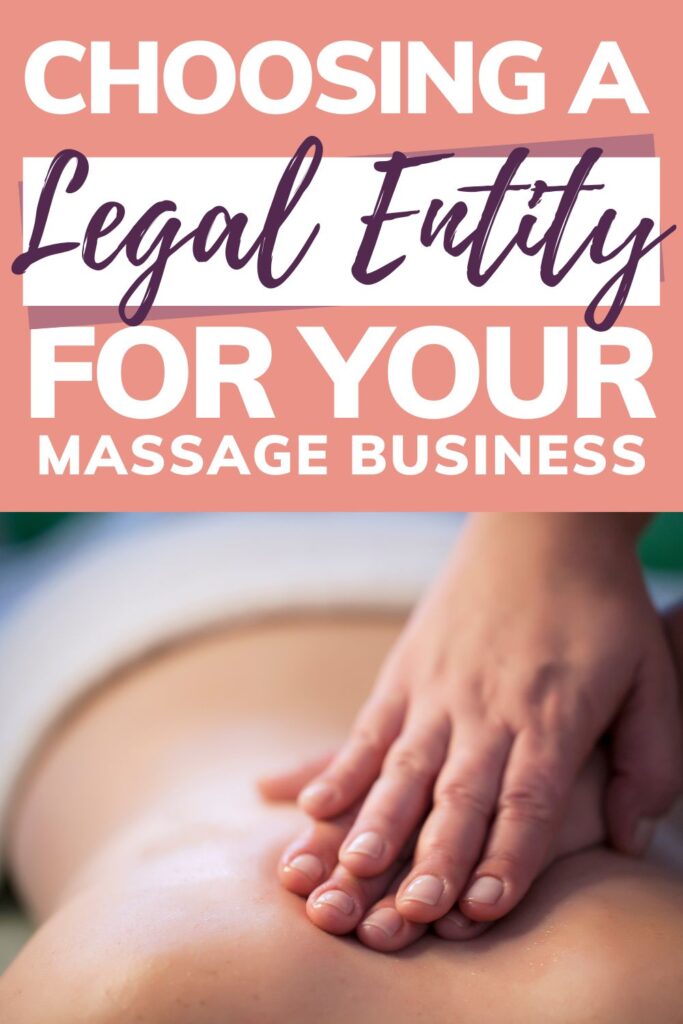As an Affiliate for Amazon and other companies, I earn from qualified purchases.
In this post: Choosing a legal entity for your massage business, is the topic of this episode of “Align with The Massage Business Mama,” we unpack one of the big struggles entrepreneurs experience when starting their business.
ALIGN WITH THE MASSAGE BUSINESS MAMA A PODCAST BRINGS YOU

EPISODE 042: Choosing A Legal Entity for Your Massage Business
One of the big things that trip people up at the beginning of their massage business is figuring out what legal entity to set up. Whether to be a sole proprietor, partnership, corporation, or LLC. C Corp, S corp, it can be overwhelming initially!
One thing to note is if you take no action, the IRS automatically considers you a sole proprietorship. So, if you are struggling with paralysis analysis for how to structure your business. You have already inadvertently made a decision. By failing to make any official decisions or moves to create a business entity, you are operating as a sole proprietorship.
Listen on to hear more about the pros and cons of each entity.
Sole Proprietorships
As a Sole Proprietor, you have to pay all the taxes that you might traditionally be used to an employer taking out of your checks already. You and your business are the same entity, so if you or your business were to be sued, everything that is yours (including house, savings, and personal assets), as well as all your business’s assets, would be at risk.
As a Sole proprietor, you can withdraw money from your business, but it isn’t considered a wage and can’t be deducted as a business expense. While you won’t pay payroll taxes on your draw, you do pay self-employment and income taxes. The business does not file taxes or pay income tax.
Instead, you file a Schedule C with your 1040 form and pay personal income taxes on the profit. A Schedule C is where you list all your and your business’s profits and losses, and deductions for the year.
A sole proprietorship is the easiest to set up, but it doesn’t have any protections or tax benefits other entities do. If you go this route, you will want to consider setting up a DBA “doing business as.”
Partnerships
A partnership behaves a whole lot like a sole proprietorship in its taxation. It’s two or more entities starting a business with a DBA, even if it’s their personal names.
With a Partnership, you file a Schedule K-1 (Form 1065). The partnership itself doesn’t pay taxes. Instead, each partner reports their profits and losses on their individual tax return. A schedule K-1 form reports each partner’s share of the partnership’s profit/losses etc. It is called a “pass-through” or “flow-through” entity when a business income is treated as personal income. A simple partnership has all of the qualities/risks and ease of a sole proprietorship.
LLCs
An LLC, or Limited Liability Company, is an entity that you, the owner, creates, controls, and operates. But it is a separate entity from you. Each state has its own statutes concerning LLCs, so if you go this route, make sure to check what that looks like in your area.
Here is a site that helps break down the requirements in each of the 50 US states.
LLCs have the most flexible taxation options. You can either be taxed as an S-Corp, C-Corp, partnership, or a sole proprietor. The default is sole proprietor taxation, but you can ELECT to be taxed as an S or C corp.
In this structure, you are not personally liable for the company’s debts or liabilities. This offers a certain level of security that is great in the massage industry.
Disclaimer: We are not lawyers or accountants. You may wish to consult with one before finalizing your legal entity decision.
Listen here: 042: Choosing A Legal Entity for Your Massage Practice
If you have any questions or would like us to cover a specific topic on the podcast, please reach out! We love hearing from listeners! And are open to suggestions! So please, don’t be shy!
You also might like: Podcast Episode 012: Taxes for Massage Therapists

Author Profile
-
Ali Boehm
- Boulder College of Massage Therapy Graduate
- Nationally Certified through NCBTMB
- Colorado Licensed Massage Therapist
- Certified CranialSacral Level 1 through Upledger
- Certified Herbal Therapist through Nutrition Therapy Institute
- Certified Fujian Massage through Barefoot Masters
- Fort Lewis College - Majored in Art, Minored in Business Administration
- 6 Year Winner of Best Massage Therapist for "Best of The Boat" Competition
- Massage Business Owner Since 2008




